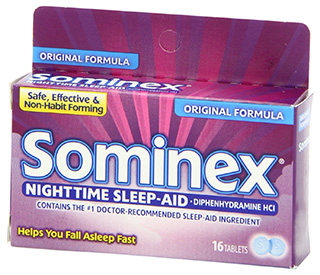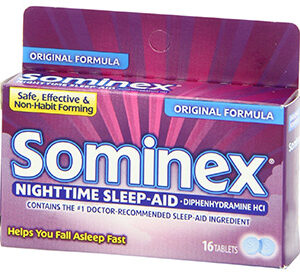Drug Name: Sominex
Indications and Usage
Sominex is a medication primarily indicated for the relief of occasional sleeplessness. It is also utilized as a nighttime sleep-aid, assisting individuals who have trouble achieving restful slumber. Sominex’s sedative effects can also help alleviate minor aches and pains when they interfere with a good night’s rest.
Dosage and Administration
The usual adult dosage of Sominex is one to two tablets taken 30 minutes before bedtime, or as directed by a healthcare provider. It is imperative to adhere to the recommended dosage and not exceed the maximum daily intake to avoid potential health complications or exacerbation of side effects. For specific dosage recommendations or adjustments, consult your healthcare professional, particularly for individuals with underlying health conditions or those on other medications.
Contraindications
Sominex should not be taken by individuals with known hypersensitivity to its active ingredients or excipients. Additionally, it is contraindicated in persons currently under the influence of alcohol, other CNS depressants, or in cases of concurrent therapy with monoamine oxidase inhibitors (MAOIs) or within two weeks of stopping such treatment. Special caution should be taken concerning individuals suffering from respiratory diseases, such as asthma, sleep apnea, or chronic obstructive pulmonary disease (COPD).
Warnings and Precautions
The sedative effects of Sominex can significantly impair mental and physical abilities required for the performance of potentially dangerous tasks such as driving a car or operating machinery. The concurrent use of Sominex with alcohol or other CNS depressants may have compound effects and should be avoided. Patients should be made aware that Sominex can also worsen certain conditions, such as urinary retention, angle-closure glaucoma, and some stomach disorders. Exercise caution in individuals with enlarged prostate or hyperthyroidism.
Drug Interactions
Sominex may interact with other CNS depressants resulting in heightened sedation or drowsiness. It can also interact with various other drugs, potentially altering their efficacy or increasing the likelihood of adverse effects. Inform the healthcare provider of all medications currently being taken, including prescription drugs, over-the-counter medicines, and herbal supplements to evade any undesirable interactions.
Adverse Reactions
Common adverse reactions to Sominex may include drowsiness, dizziness, disturbed coordination, gastrointestinal disturbances, and dry mouth. More severe reactions, though less frequent, encompass heart palpitations, blurred vision, and hypersensitivity reactions, including rash, itching, or trouble breathing. If adverse reactions are severe or persist, seek medical attention promptly.
Overdosage
In the event of overdosage, Sominex can cause severe health complications, such as extreme drowsiness, seizures, and even coma. Immediate medical attention is critical. Treatment of overdosage consists of supportive measures tailored to the symptoms presented, ensuring an open airway and monitoring of cardiovascular and vital signs. Gastric decontamination may be considered if the patient presents shortly after ingestion.
Clinical Pharmacology
Sominex’s primary component is typically an antihistamine that exhibits sedative properties. The medication’s onset of action generally occurs within 15-30 minutes of ingestion, with its effects lasting up to six hours. Sominex works by blocking histamine receptors in the brain which are responsible for wakefulness.
Nonclinical Toxicology
Preclinical studies with Sominex’s active ingredients have shown potential toxicity at doses significantly higher than those administered to humans. These studies encompass chronic toxicity, carcinogenic potential, and effects on fertility. The relevance of these findings to human use has often been found to be not directly or clearly applicable.
Pregnancy
Due to the limited research on the effects of Sominex in pregnant individuals, the medication should be used during pregnancy only if clearly needed and after a careful assessment of the potential risks and benefits. Patients who are trying to conceive or suspect they may be pregnant should consult with their healthcare provider before using Sominex.
Nursing Mothers
It is known that some of Sominex’s active components excrete into human breast milk. Given the potential for serious adverse reactions in nursing infants, a decision should be made whether to discontinue nursing or discontinue the drug, taking into account the drug’s necessity for the mother.
Pediatric Use
The safety and effectiveness of Sominex in pediatric patients have not been established. Therefore, its usage in children is not recommended. Always consult a pediatrician before administering any medication to a child.
Geriatric Use
Elderly patients may respond to Sominex with increased sensitivity. They are more susceptible to dizziness, sedation, hypotension, and other adverse reactions, which may increase the risk of falls. Dose adjustment may be required, and consultation with a healthcare professional is advised before use.
Drug Abuse and Dependence
While Sominex is not typically associated with drug abuse or physical dependence, misuse of the medication in a manner inconsistent with its labeling or for prolonged periods can lead to health complications and may indicate underlying disorders such as chronic insomnia.
Patient Counseling Information
Advise patients to take Sominex strictly as indicated and not to exceed the recommended dosage. Alert to the potential for next-day drowsiness and instruct against driving or operating heavy machinery. Patients with pre-existing conditions or those taking other medications should consult their healthcare provider before use. Discuss the potential risks and benefits of Sominex use during pregnancy and breastfeeding.
Storage and Handling
Sominex should be stored at room temperature, away from moisture, heat, and light. Keep the medication out of reach of children and properly discard any unused or expired tablets.
How Supplied/Storage and Handling
Sominex is supplied in tablet form and should be kept in its original packaging until it is time to take the medication. Follow the specified storage conditions to maintain its efficacy and prevent degradation. Check the label for any specific storage instructions.




Reviews
There are no reviews yet.